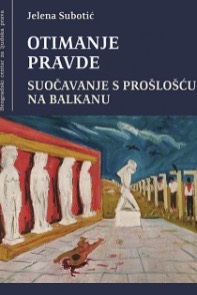In The Art of Status, I examine the relationship between looting of art and international status. Why is art restitution a matter of politics? How does the artwork displayed in national museums reflect the international status of the state that owns it? Why do some states agree to return looted art and others resist? I answer these questions with a detailed exploration of the Parthenon (‘Elgin’) Marbles, the Benin Bronzes, and a never-before written about collection of paintings looted during the Holocaust that is now housed at the National Museum of Serbia. The book tells the story of these artworks, how they were looted, how they ended up on display in national museums, and how the art restitution disputes have unfolded.
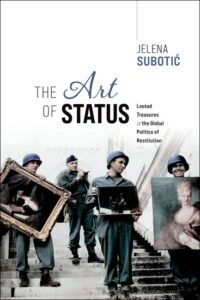
Politics, Violence, Memory highlights important new social scientific research on the Holocaust and initiates the integration of the Holocaust into mainstream social scientific research in a way that will be useful both for social scientists and historians. Until recently social scientists largely ignored the Holocaust despite the centrality of these tragic events to many of their own concepts and theories.The book brings together contributions to understanding the Holocaust from a variety of disciplines, including political science, sociology, demography, and public health. The chapters examine the sources and measurement of antisemitism; explanations for collaboration, rescue, and survival; competing accounts of neighbor-on-neighbor violence; and the legacies of the Holocaust in contemporary Europe. Politics, Violence, Memory brings new data to bear on these important concerns and shows how older data can be deployed in new ways to understand the “index case” of violence in the modern world.
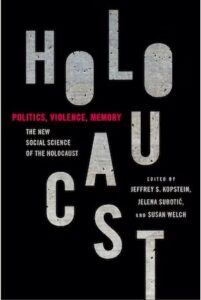
- Winner of the 2020 Joseph Rothschild Prize in Nationalism and Ethnic Studies
- Co-Winner of the 2020 American Political Science Association European Politics and Society Book Prize
- Co-Winner of the 2020 Robert L. Jervis and Paul W. Schroeder Prize for the Best Book in International History and Politics (American Political Science Association)
- Honorable mention, 2020 Barbara Heldt Prize for Best Book by a woman in any area of Slavic/East European/Eurasian Studies (Association of Women in Slavic Studies)
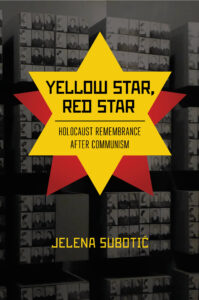
In this book, I ask why Holocaust memory continues to be fraught – ignored, appropriated, or obfuscated – throughout Eastern Europe, the principal location of the Holocaust. As part of European Union accession process, East European states were required to adopt, participate in and contribute to the already established Western narrative of the Holocaust. This has created anxiety and resentment in post-communist states, because this Holocaust memory has replaced the centrality of communist terror as the dominant narrative of the 20th century in Eastern Europe with a new focus on predominantly Jewish suffering in World War II. Influencing European Union’s own memory politics and legislation in the process, post-communist states have attempted to reconcile these two memories by pursuing new strategies of Holocaust remembrance where the memory, symbols, and imagery of the Holocaust become appropriated to represent crimes of communism.
Based on extensive fieldwork and analysis of museums and memorials, history textbooks, and public commemorations, the book presents in-depth case studies of Holocaust remembrance practices in Serbia, Croatia, and Lithuania, and then extends the discussion to other East European states. I demonstrate how countries of the region used Holocaust remembrance as a political strategy to resolve their contemporary “ontological insecurities” – insecurities about their identities, about their international status, and about their relationships with other international actors. Holocaust memory in Eastern Europe was never either about the Holocaust or about the desire to remember the past – during communism or in its aftermath – but instead about managing national identities in a precarious and uncertain world.
Serbian translation of Yellow Star, Red Star, published by Clio, 2021.
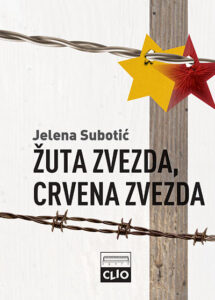
In my first book, I trace the design, implementation, and political outcomes of institutions established to deal with the legacies of violence in the aftermath of the Yugoslav wars. I document ways in which international norms to establish accountability for war crimes have been used to pursue very different local political goals. Responding to international pressures, Serbia, Croatia, and Bosnia have implemented various mechanisms of “transitional justice”—the systematic addressing of past crimes after conflicts end. Transitional justice in the three countries, however, was guided by ulterior political motives: to get rid of domestic political opponents, to obtain international financial aid, or to gain admission to the European Union. I argue that when transitional justice becomes “hijacked” for such local political strategies, it fosters domestic backlash, deepens political instability, and even creates alternative, politicized versions of history. My findings point to the many paradoxical effects of international normative interventions in domestic politics of target states.
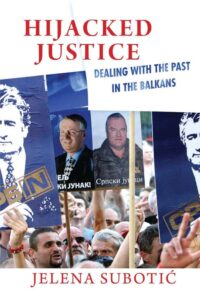
OTIMANJE PRAVDE: SUOČAVANJE S PROŠLOŠĆU NA BALKANU
Serbian translation of Hijacked Justice, published by the Belgrade Centre for Human Rights, 2010.
